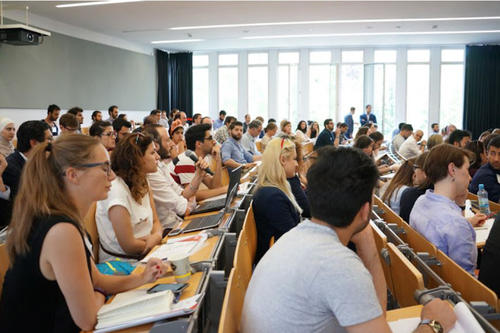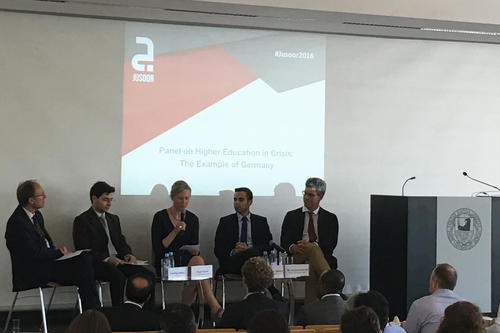"You just have to concentrate on the present."
Panel Discussion at Freie Universität on Training Situation of Syrian Refugees in Germany
Jun 17, 2016
Participants from all over the world sat in the audience of the fourth international Jusoor conference.
Image Credit: DAAD
Panel discussion about the educational situation of Syrian refugees in Germany: Christian Müller, Edgar Kaade, Esther Saoub, Bashar Diar Bakerly, and Florian Kohstall (left to right).
Image Credit: Jusoor
There was a lot of activity in the Henry Ford Building of Freie Universität: participants from all over the world were bustling around at the fourth international Jusoorconference. Jusoor is a nongovernmental organization committed to young refugees from Syria who need to continue their studies in other countries. The participants of the conference, which was organized by Freie Universität and the DAAD, came from various countries, including Portugal, England, Turkey, and Syria. The day started with a panel discussion about the possibilities for Syrian students in Germany.
Christian Müller, the director of the Strategy Division of the German Academic Exchange Service (DAAD) opened the discussion moderated by the journalist Esther Saoub. He told about the DAAD's Leadership for Syria (LfS) program, which the DAAD started in 2014. Since then, it has given opportunities to 200 Syrian students per year to study in Germany. For this year alone there were 5000 applications. "That gives you an idea of the huge demand," said Müller.
Language and Choice of Subject Play Crucial Roles
"I came to Germany because the universities here are flexible in accepting students," said Edgar Kaade, who has been studying biomedical science in Bonn since 2015 and is participating in the LfS Program. He started his studies in Aleppo, and originally wanted to continue in France. At the time, however, he lacked the necessary forms for the application. "In Germany I was allowed to submit them later," he said.
Bashar Diar Bakerly, a Syrian DAAD alumnus, came to Germany in 2002, long before the Civil War began. His reasons were purely educational – "I studied chemistry, and Germany was the first choice," he said.
The fourth panelist was Florian Kohstall, the coordinator of the Welcome to Freie Universität Berlin program, which aims to facilitate refugees' access to studying at Freie Universität. Kohstall said that two things are important in order for integration to work: language skills and orientation. In order to apply for a bachelor's degree program at Freie Universität, the refugees need to learn German sufficient for studying an academic subject. "At Freie Universität we offer German language courses at various levels of difficulty," said Kohstall, "and the classes are in great demand. Orientation is also very important, and we help with that. At first, the participants need to find out what sorts of degree programs are offered at Freie Universität."
Uncertain Return
Christian Müller urged the universities to make more money available to help refugees gain access to higher education. At the end of the discussion, the moderator Saoub raised a difficult question: Will the Syrian students return to their homeland when the war is over? Or do they want to build up a future here? "I actually only wanted to study here," answered Kaade. "But now I can’t say, if and when I will return." Bakerly is certain that many Syrians who get an education here in Germany will also stay in Germany permanently. "Regardless of how they might think about it today, in a few years they will have changed. Maybe be then they will have started a family here. You just have to concentrate on the present."


